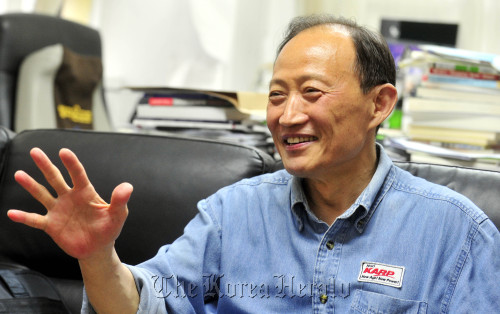
Head of retirees’ associationstresses new approach to retirement
As 7.1 million baby boomers in Korea near retirement, the whole nation seems to be growing nervous.
But retirement itself is not a social problem. It is a celebrated phase in one’s life and should be more so for the Korean boomers, who have worked harder than any other people in the world, said Juch Myong-yong, head of the Korean Association of Retired Persons.
“Retirement is all over the news these days. What’s troubling me is that most have negative connotations, emphasizing the money problems,” he recently told The Korea Herald.
 |
Juch Myong-yong, chairman of the Korean Association of Retired Persons, in a recent interview with The Korea Herald. (The Korea Herald/ Kim Myung-sub) |
Money is an important part of successful retirement life, but not all that matters. “What’s more important is a social role which makes one’s life meaningful,” he said.
The nation and boomers themselves must ponder ways to ensure that their generation with accumulated experience and know-how can continue to contribute to society after retirement, he said.
“On a personal level, they need to consider retirement as a chance to begin a new chapter in their life, start new activities and set new goals,” he stressed.
Juch himself is an example.
Having emigrated to the United States in 1981, he was a successful businessman and a leader in Korean immigrants’ community in New York.
After retirement, he returned to Korea and founded KARP in 2001, taking a cue from the American Association of Retired Persons.
The AARP is one of the most powerful lobbying groups in the United States, representing nearly 40 million retirees or pre-retirees.
“In Korea, there was no such group that relayed voices of retirees to the government, politicians and major businesses. I thought I can do something to change that,” he said.
A decade after founding KARP, the organization is far from being as influential as AARP. On the contrary, it struggles with shortages of funds and staff, but Juch believes that he is making changes for retirees and pre-retirees.
One such change is the law on age discrimination in employment, which went into effect in 2009.
“It was something that we, the KARP, had spent seven years campaigning for,” he said.
In the U.S., the age discrimination in employment act was introduced in 1967, was later amended to prohibit employers from forcing retirement on the basis of age.
The Korean law is not so strict as the U.S. one, as Juch hoped. Many Korean companies have a set retirement age of between 55 and 58.
The KARP, while working to delay the retirement age, is now focusing on jobs for retirees, as many here exit workforce financially unprepared and thus have no other option but to take any job available to make ends meet.
“I believe that it is a duty of the government to build systems which ensure that if a person has worked diligently, he or she can expect to live with dignity after retirement,” Juch said.
By Lee Sun-young (
milaya@heraldcorp.com)









![[Today’s K-pop] Blackpink’s Jennie, Lisa invited to Coachella as solo acts](http://res.heraldm.com/phpwas/restmb_idxmake.php?idx=644&simg=/content/image/2024/11/21/20241121050099_0.jpg)